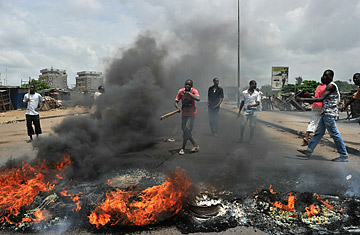
Abidjan residents burn tires where security forces loyal to Gbagbo opened fire on demonstrators, killing at least six women
When the pop of machine guns began on the morning of March 3, Moussa N'Diaye, a car washer in Ivory Coast's main city of Abidjan, hurriedly pulled down the shutters on his roadside shop. He climbed atop a nearby wall and watched the unfolding scene with horror. "I wanted to get down from the wall, but I was just in shock," he says, speaking in hushed tones. "An armored car approached, and from somewhere the noise of guns was still going on. Bodies fell."
After a third week of running gun battles in Abidjan, the former pearl of West Africa looks to be sliding irretrievably toward a repeat of the 2002 civil war that divided the country into a government-controlled south and rebel-held north. On March 3, in the opposition stronghold Abobo district, a protest by several hundred women against President Laurent Gbagbo turned into a bloodbath when the army opened fire, mowing down the protesters and killing at least six women. "The armored car didn't stop for the dead bodies," says N'Diaye. "Some people had to run to pull them out of the way."
Since losing an election in November, Gbagbo has refused to leave office despite his opponent Alassane Ouattara's having been recognized as the rightful leader by the U.N., the European Union and both the African Union and Economic Community of West African States (ECOWAS). The March 3 massacre is just the latest manifestation of Gbagbo's desperate attempts to hold on to power. According to the U.N., at least 26 people were killed in Abobo the previous day, and some 20,000 have fled the district, which has been at the heart of intense fighting between government security forces and insurgents who back Ouattara. Since the elections, the death toll has been rising daily — almost 400 deaths have been registered by the U.N. since November. Most victims are Ouattara supporters; alleged sites of mass graves are still being blocked by pro-Gbagbo forces.
With plumes of black smoke rising over the Abidjan skyline every day as angry youths burn tires, the African Union has shown little resolve in easing the postelectoral stalemate. The body extended a deadline for taking action until the end of March — the second time it has delayed taking measures, even as the U.N. warns of impending civil war.
The deepening violence comes amid another burgeoning humanitarian crisis after electricity was cut off in the north of the country — a region historically loyal to Ouattara. The national power grid said on Feb. 28 that armed men had entered its compound and ordered that power be shut off. Gbagbo's government claims the move was necessary amid ongoing E.U.- and U.S.-led sanctions, which it says have prevented the delivery of spare generator parts. The outage echoes an identical incident in 2002, when Gbagbo oversaw a three-week blackout as Ivory Coast was rocked by a civil war.
"Hospitals can't operate — dialysis, operations, even giving birth — all these things can no longer be safely carried out," Felicien Sekongo, spokesman for the rebel Forces Nouvelles, which administer the north, tells TIME. "There is no water because water plants require electricity to operate. We are living like we're back to the dark ages."
But even in the south, anger is growing as economic sanctions appear to have made Gbagbo increasingly desperate — and consequently ruthless. "I voted Gbagbo," says teacher Franck Agny. "But I don't understand how a leader of this country can use tanks and break human rights like this. We don't want war, but only Gbagbo will be to blame if it happens."
These days Abidjan's streets empty as soon as dusk starts to fall. The boom of gunfire and rocket-propelled grenades resounds off the city's lagoon throughout the night, and each morning brings news of more deaths — and little sign that diplomacy can prevail in dislodging Gbagbo.
